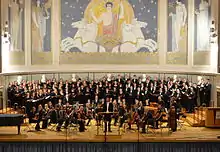MünchenKlang
MünchenKlang is a Munich ensemble comprising a choir and an orchestra. The name is a compound of its city of origin (München) and the German word for sound (Klang).
MünchenKlang | |
|---|---|
 | |
| Background information | |
| Origin | Munich, Germany |
| Genres | Classical |
| Years active | 2013–present |
| Website | www.MuenchenKlang.de |
| Members | Thomas Hefele (conductor) |
History

MünchenKlang was founded in 2013 by a group of musically interested students with the intention of performing classical music for choir and orchestra. The orchestra is established as a project orchestra, rehearsing only a few weekends per project to prepare a concert. The choir rehearses weekly. There are more than 150 members of different age groups, professions and disciplines of study. MünchenKlang is organised as a noncommercial voluntary association.[1]
The ensemble performs two or three concerts per year in different venues, such as the Neue Pfarrkirche St. Margaret, the Große Aula of the Ludwig Maximilian University of Munich or the Philharmonie am Gasteig. Concert tours have led MünchenKlang to perform in the Brucknerhaus in Linz, Austria[2][3] and as part of the Expo 2015 programme at the Castello Sforzesco in Milan, Italy.[4] The ensemble has collaborated with ARD award winning singers Sumi Hwang and Wilhelm Schwinghammer.[5]
The association also pursues cultural policy objectives and engages in an ongoing debate regarding the new Munich concert hall.[6] Around 500 citizens followed MünchenKlang's call to demonstrate for a new concert hall on March 7, 2015 at the Odeonsplatz.[7] MünchenKlang supports the association Konzertsaal München e.V., which was founded by the Bavarian minister of state Kurt Faltlhauser.[8]
Conductors

Since their inception in 2013, the choir and orchestra of MünchenKlang have been conducted by Thomas Hefele. Under his baton the ensemble has performed pieces such as the Messa da Requiem by Giuseppe Verdi, the Christmas Oratorio by Johann Sebastian Bach, the Italian Symphony by Felix Mendelssohn and the cantata Der Stern von Bethlehem (The Star of Bethlehem) by Josef Rheinberger.[9]
References
- MünchenKlang, The academy of talents, Technical University of Munich, accessed February 2, 2016.
- Schüler und Profi Musiker veranstalten ein gemeinsames Filmmusik Projekt (Students and professionals perform together in a film music project) , www.nachrichten.at, October 10, 2013.
- Cinematics Nacht der Filmmusik (Cinematics the night of film music), www.play-orchester.at, August 28, 2013.
- Orchestra e Coro München Klang di Monaco di Baviera Archived 2016-01-31 at the Wayback Machine, Camera di Commercio Industria Artigianato e Agricoltura di Milano, August 2015.
- Klassische Klänge – Verdi Messa da Requiem mucbook, June 27, 2014.
- Munich Philharmonic Responds To Concert Hall Controversy, Forbes, March 4, 2015.
- Kundgebung für den Konzertsaal: Musikalischer Protest, Süddeutsche Zeitung, March 7, 2015.
- Konzertsaal München e. V.
- MünchenKlang – Klassik erleben, Zukunftswerkstatt Hochschule, June 26, 2014.